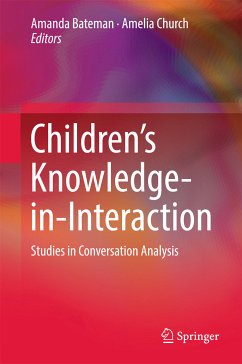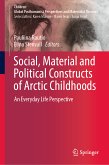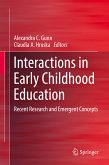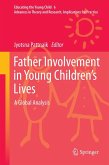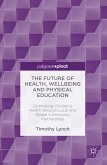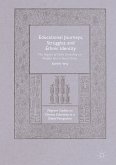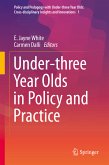Children's Knowledge-in-Interaction (eBook, PDF)
Studies in Conversation Analysis
Redaktion: Bateman, Amanda; Church, Amelia
105,95 €
105,95 €
inkl. MwSt.
Sofort per Download lieferbar

53 °P sammeln
105,95 €
Als Download kaufen

105,95 €
inkl. MwSt.
Sofort per Download lieferbar

53 °P sammeln
Jetzt verschenken
Alle Infos zum eBook verschenken
105,95 €
inkl. MwSt.
Sofort per Download lieferbar
Alle Infos zum eBook verschenken

53 °P sammeln
Children's Knowledge-in-Interaction (eBook, PDF)
Studies in Conversation Analysis
Redaktion: Bateman, Amanda; Church, Amelia
- Format: PDF
- Merkliste
- Auf die Merkliste
- Bewerten Bewerten
- Teilen
- Produkt teilen
- Produkterinnerung
- Produkterinnerung

Bitte loggen Sie sich zunächst in Ihr Kundenkonto ein oder registrieren Sie sich bei
bücher.de, um das eBook-Abo tolino select nutzen zu können.
Hier können Sie sich einloggen
Hier können Sie sich einloggen
Sie sind bereits eingeloggt. Klicken Sie auf 2. tolino select Abo, um fortzufahren.

Bitte loggen Sie sich zunächst in Ihr Kundenkonto ein oder registrieren Sie sich bei bücher.de, um das eBook-Abo tolino select nutzen zu können.
This book is a collected volume that brings together research from authors working in cross-disciplinary academic areas including early childhood, linguistics and education, and draws on the shared interests of the authors, namely understanding children's interactions and the co-production of knowledge in everyday communication. The collection of studies explores children's interactions with teachers, families and peers, showing how knowledge and learning are co-created, constructed and evident in everyday experiences.
- Geräte: PC
- ohne Kopierschutz
- eBook Hilfe
- Größe: 33.89MB
Andere Kunden interessierten sich auch für
![Social, Material and Political Constructs of Arctic Childhoods (eBook, PDF) Social, Material and Political Constructs of Arctic Childhoods (eBook, PDF)]() Social, Material and Political Constructs of Arctic Childhoods (eBook, PDF)89,95 €
Social, Material and Political Constructs of Arctic Childhoods (eBook, PDF)89,95 €![Interactions in Early Childhood Education (eBook, PDF) Interactions in Early Childhood Education (eBook, PDF)]() Interactions in Early Childhood Education (eBook, PDF)89,95 €
Interactions in Early Childhood Education (eBook, PDF)89,95 €![Father Involvement in Young Children's Lives (eBook, PDF) Father Involvement in Young Children's Lives (eBook, PDF)]() Father Involvement in Young Children's Lives (eBook, PDF)73,95 €
Father Involvement in Young Children's Lives (eBook, PDF)73,95 €![Voices of Transgender Children in Early Childhood Education (eBook, PDF) Voices of Transgender Children in Early Childhood Education (eBook, PDF)]() Ashley L. SullivanVoices of Transgender Children in Early Childhood Education (eBook, PDF)69,95 €
Ashley L. SullivanVoices of Transgender Children in Early Childhood Education (eBook, PDF)69,95 €![The Future of Health, Wellbeing and Physical Education (eBook, PDF) The Future of Health, Wellbeing and Physical Education (eBook, PDF)]() Timothy LynchThe Future of Health, Wellbeing and Physical Education (eBook, PDF)40,95 €
Timothy LynchThe Future of Health, Wellbeing and Physical Education (eBook, PDF)40,95 €![Educational Journeys, Struggles and Ethnic Identity (eBook, PDF) Educational Journeys, Struggles and Ethnic Identity (eBook, PDF)]() Xinyi WuEducational Journeys, Struggles and Ethnic Identity (eBook, PDF)40,95 €
Xinyi WuEducational Journeys, Struggles and Ethnic Identity (eBook, PDF)40,95 €![Under-three Year Olds in Policy and Practice (eBook, PDF) Under-three Year Olds in Policy and Practice (eBook, PDF)]() Under-three Year Olds in Policy and Practice (eBook, PDF)65,95 €
Under-three Year Olds in Policy and Practice (eBook, PDF)65,95 €-
-
-
This book is a collected volume that brings together research from authors working in cross-disciplinary academic areas including early childhood, linguistics and education, and draws on the shared interests of the authors, namely understanding children's interactions and the co-production of knowledge in everyday communication. The collection of studies explores children's interactions with teachers, families and peers, showing how knowledge and learning are co-created, constructed and evident in everyday experiences.
Dieser Download kann aus rechtlichen Gründen nur mit Rechnungsadresse in A, B, BG, CY, CZ, D, DK, EW, E, FIN, F, GR, HR, H, IRL, I, LT, L, LR, M, NL, PL, P, R, S, SLO, SK ausgeliefert werden.
Produktdetails
- Produktdetails
- Verlag: Springer Nature Singapore
- Seitenzahl: 369
- Erscheinungstermin: 25. Oktober 2016
- Englisch
- ISBN-13: 9789811017032
- Artikelnr.: 46922797
- Verlag: Springer Nature Singapore
- Seitenzahl: 369
- Erscheinungstermin: 25. Oktober 2016
- Englisch
- ISBN-13: 9789811017032
- Artikelnr.: 46922797
- Herstellerkennzeichnung Die Herstellerinformationen sind derzeit nicht verfügbar.
Amanda Bateman currently works at the University of Waikato, New Zealand as a senior lecturer in early childhood education. She has led various research projects using conversation analysis to explore peer-peer relationships and teacher-child interactions, and is currently Principal Investigator on a project exploring children's storytelling in early childhood through to primary school. Her book Conversation Analysis and Early Childhood Education: The Co-Production of Knowledge and Relationships discusses findings from her project investigating teacher-child interactions in New Zealand early childhood education. Amelia Church is a lecturer at the Melbourne Graduate School of Education at The University of Melbourne, where she teaches courses in research methods in early childhood education and applied conversation analysis as well as qualitative research methods. She holds a PhD in linguistics from Monash University and published this research as part of the Ashgate series Directions in Ethnomethodology and Conversation Analysis, which is included in the book Preference Organisation and Peer Disputes: How young children resolve conflict. Her current research involves children's talk, classroom interactions, and how misunderstanding is resolved in talk-in-interaction.
1 Children's Knowledge-in-interaction: An introduction.- 2 Epistemic Trajectories in the Classroom: How children respond in informing sequences.- 3 Questions and Answers, a Seesaw and Embodied Action: How a preschool teacher and children accomplish educational practice.- 4 Web searching as a context to build on young children's displayed knowledge.- 5 Mathematics Knowledge in Early Childhood: Intentional teaching in the third turn.- 6 Pursuing a Telling: Managing a multi-unit turn in children's storytelling.- 7 Co-producing Cultural Knowledge: Children telling tales in the school playground.- 8 Don't laugh! Socialization of laughter and smiling in pre-school and school settings.- 9 Schoolyard Suspect: Blame negotiations, category work and conflicting versions among children and teachers.- 10 The Preschool Entrance Hall: A bilingual transit zone for preschoolers.- 11 Sparkling, Wrinkling, Softly Tinkling: On poetry and word meaning in a bilingual primary classroom.- 12 Relating with anUnborn Baby: Expectant mothers socializing their toddlers in Japanese families.- 13 Young children's initial assessments in Japanese.- 14 Learning how to use the word 'Know': Examples from a single-case study.- 15 The emergence of Story-telling.- 16 "What does it say about it?": Doing reading and doing writing as part of family mealtime.- 17 Producing knowledge with digital technologies in sibling interaction.- 18 "You can get cyberbullied by your friends": Claiming authority to categorise a past event as bullying.- 19 'It's gonna work': Spontaneous activity and knowledge management by a child with Asperger's Syndrome.
1 Children's Knowledge-in-interaction: An introduction.- 2 Epistemic Trajectories in the Classroom: How children respond in informing sequences.- 3 Questions and Answers, a Seesaw and Embodied Action: How a preschool teacher and children accomplish educational practice.- 4 Web searching as a context to build on young children's displayed knowledge.- 5 Mathematics Knowledge in Early Childhood: Intentional teaching in the third turn.- 6 Pursuing a Telling: Managing a multi-unit turn in children's storytelling.- 7 Co-producing Cultural Knowledge: Children telling tales in the school playground.- 8 Don't laugh! Socialization of laughter and smiling in pre-school and school settings.- 9 Schoolyard Suspect: Blame negotiations, category work and conflicting versions among children and teachers.- 10 The Preschool Entrance Hall: A bilingual transit zone for preschoolers.- 11 Sparkling, Wrinkling, Softly Tinkling: On poetry and word meaning in a bilingual primary classroom.- 12 Relating with anUnborn Baby: Expectant mothers socializing their toddlers in Japanese families.- 13 Young children's initial assessments in Japanese.- 14 Learning how to use the word 'Know': Examples from a single-case study.- 15 The emergence of Story-telling.- 16 "What does it say about it?": Doing reading and doing writing as part of family mealtime.- 17 Producing knowledge with digital technologies in sibling interaction.- 18 "You can get cyberbullied by your friends": Claiming authority to categorise a past event as bullying.- 19 'It's gonna work': Spontaneous activity and knowledge management by a child with Asperger's Syndrome.
